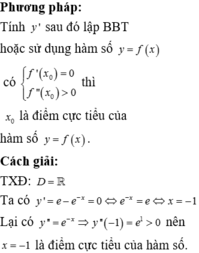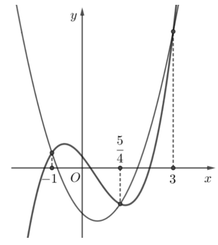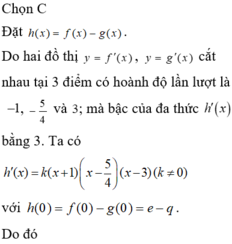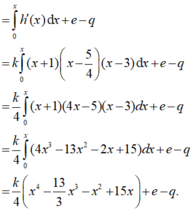cho hàm số y= e.x + e^-x. nghiệm của pt y'=0 là?
Hãy nhập câu hỏi của bạn vào đây, nếu là tài khoản VIP, bạn sẽ được ưu tiên trả lời.


a: Vì a=-1<0 nên hàm số nghịch biến trên khoảng (2;+∞) và đồng biến trên khoảng (-∞;2]
Bảng biến thiên là:
| x | -∞ | 2 | +∞ |
| y | -∞ | 1 | -∞ |

1.
Hàm số xác định khi: \(1-2sinx\ne0\Leftrightarrow sinx\ne\dfrac{1}{2}\Leftrightarrow\left[{}\begin{matrix}x\ne\dfrac{\pi}{6}+k2\pi\\x\ne\dfrac{5\pi}{6}+k2\pi\end{matrix}\right.\)

1) Thay \(m=\sqrt{3}+1\) vào hệ phương trình, ta được:
\(\left\{{}\begin{matrix}\left(\sqrt{3}+1-1\right)x-2y=1\\3x+\left(\sqrt{3}+1\right)y=1\end{matrix}\right.\)
\(\Leftrightarrow\left\{{}\begin{matrix}\sqrt{3}x-2y=1\\3x+\left(\sqrt{3}+1\right)y=1\end{matrix}\right.\)
\(\Leftrightarrow\left\{{}\begin{matrix}3x-2\sqrt{3}y=\sqrt{3}\\3x+\left(\sqrt{3}+1\right)y=1\end{matrix}\right.\)
\(\Leftrightarrow\left\{{}\begin{matrix}-2\sqrt{3}y-y\left(\sqrt{3}+1\right)=\sqrt{3}-1\\3x-2\sqrt{3}y=\sqrt{3}\end{matrix}\right.\)
\(\Leftrightarrow\left\{{}\begin{matrix}-2\sqrt{3}y-\sqrt{3}y-y=\sqrt{3}-1\\3x-2\sqrt{3}y=\sqrt{3}\end{matrix}\right.\)
\(\Leftrightarrow\left\{{}\begin{matrix}y\left(-3\sqrt{3}-1\right)=\sqrt{3}-1\\3x-2\sqrt{3}y=\sqrt{3}\end{matrix}\right.\)
\(\Leftrightarrow\left\{{}\begin{matrix}y=\dfrac{-\sqrt{3}+1}{3\sqrt{3}+1}\\3x-2\sqrt{3}\cdot\dfrac{-\sqrt{3}+1}{3\sqrt{3}+1}=\sqrt{3}\end{matrix}\right.\)
\(\Leftrightarrow\left\{{}\begin{matrix}y=\dfrac{-5+2\sqrt{3}}{13}\\3x=\sqrt{3}-\dfrac{12+10\sqrt{3}}{13}\end{matrix}\right.\)
\(\Leftrightarrow\left\{{}\begin{matrix}y=\dfrac{-5+2\sqrt{3}}{13}\\x=\left(\dfrac{13\sqrt{3}-12-10\sqrt{3}}{13}\right)\cdot\dfrac{1}{3}=\dfrac{3\sqrt{3}-12}{13}\cdot\dfrac{1}{3}=\dfrac{\sqrt{3}-4}{13}\end{matrix}\right.\)
Vậy: Khi \(m=\sqrt{3}+1\) thì hệ phương trình có nghiệm duy nhất là \(\left\{{}\begin{matrix}x=\dfrac{\sqrt{3}-4}{13}\\y=\dfrac{-5+2\sqrt{3}}{13}\end{matrix}\right.\)











Lời giải:
Ta có:
\(y'=(e^x+e^{-x})'=e^x-e^{-x}=e^x-\frac{1}{e^x}\)
\(y'=0\Leftrightarrow e^x-\frac{1}{e^x}=0\Leftrightarrow e^{2x}-1=0\)
\(\Leftrightarrow e^{2x}=1\Leftrightarrow 2x=0\Leftrightarrow x=0\)